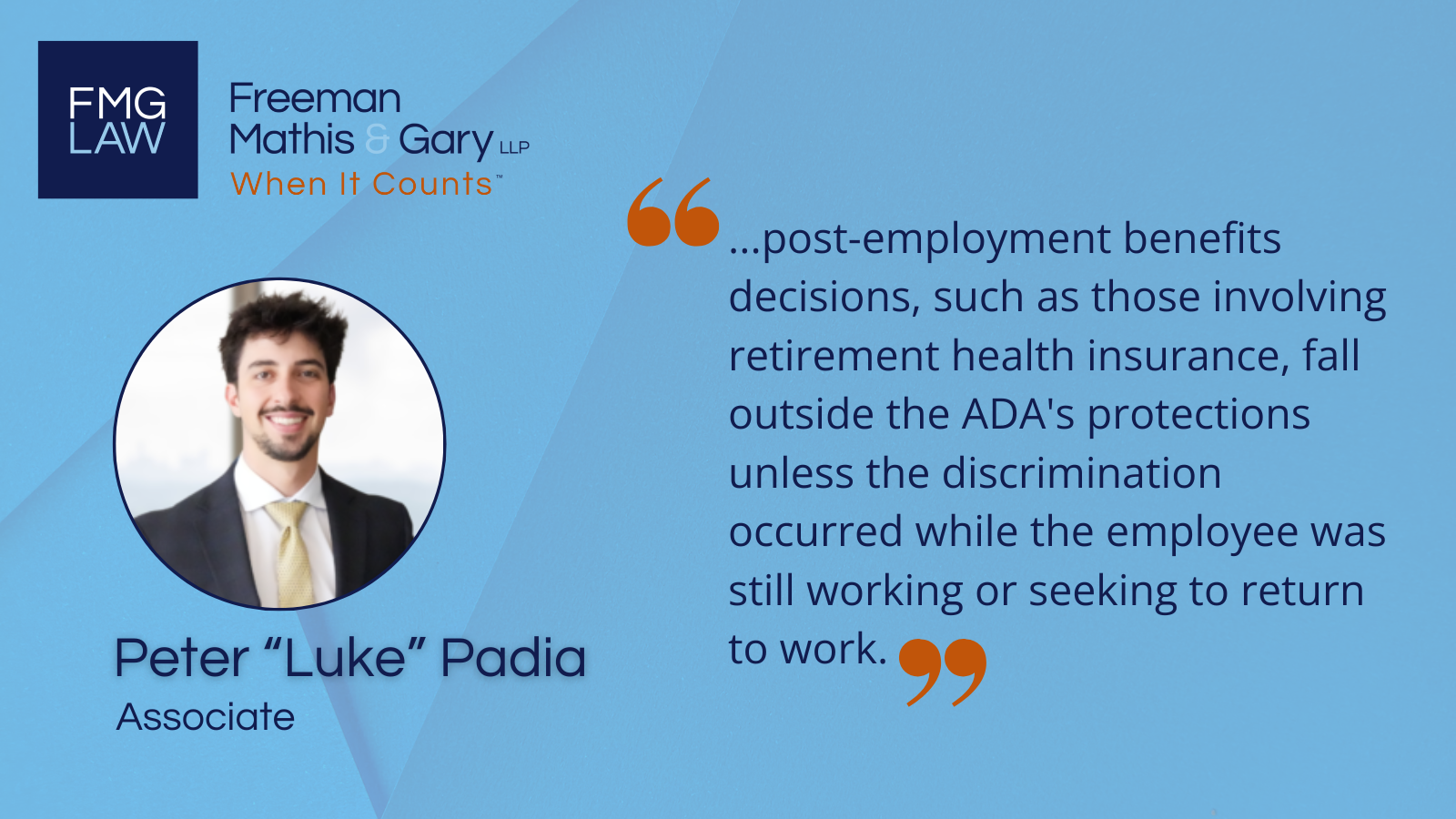BlogLine
Supreme Court limits ADA protections for retirees in 8–1 decision
6/26/25

By: Luke Padia
In an 8-1 decision issued on June 20, 2025, the U.S. Supreme Court held that the Americans with Disabilities Act (ADA) does not extend its protections to retirees who no longer hold or seek a job. The ruling in Stanley v. City of Sanford, Florida makes clear that post-employment benefits decisions, such as those involving retirement health insurance, fall outside the ADA’s protections unless the discrimination occurred while the employee was still working or seeking to return to work.
Karyn Stanley, a former firefighter in Sanford, Florida, retired in 2018 after being diagnosed with Parkinson’s disease two years earlier. When she started her job in 1999, city policy promised subsidized health coverage until age 65 for all retirees, including those who left early due to disability. But in 2003, the city revised its rules and only those with 25 years of service would keep health benefits until age 65. Those who retired due to disability, like Stanley, would only receive coverage for two years.
Stanley filed a lawsuit under the ADA, claiming the policy unfairly treated her because of her disability. Lower courts sided with the City of Sanford, concluding that she no longer met the definition of a “qualified individual” under the ADA. The lower court concluded that “qualified individual” was a term reserved for those currently employed or seeking employment and able to perform the essential duties of a job. Because Stanley was already retired when her health benefits ran out, the courts determined that the ADA did not apply to her situation.
The Supreme Court agreed. The Court explained that the ADA only protects people who are currently working or trying to get a job. Since Stanley was neither employed nor seeking reemployment when the city’s policy affected her benefits, she fell outside the scope of the ADA. The Court emphasized that protections under Title I are not intended to cover people just because they used to have a job—it’s not meant to cover retirees.
While the decision provides clarity on when the ADA does and doesn’t apply, it doesn’t completely shut the door on future lawsuits. The Court recognized that an employee might still have a valid claim if the unfair policy was put in place while they were still working, or if other laws—like the Rehabilitation Act or state laws—offer protection. As the lone dissenter, Justice Ketanji Brown Jackson criticized the majority’s ruling, arguing that it goes against the purpose of the ADA by leaving people unprotected from disability-related discrimination that still affects them after they retire.
For employers, this ruling serves as a reminder to be cautious when making changes to benefit policies. Decisions affecting health coverage and other post-retirement benefits should be clearly documented, especially when changes impact employees with disabilities. Even though the ADA doesn’t protect retirees, decisions made while someone is actively working could still lead to legal exposure. Employers should also be aware of relevant state and federal laws that may impose obligations beyond the ADA.
Ultimately, the Court’s decision marks a clear boundary for ADA employment protections: Title I is designed to support people who are participating in the workforce or trying to, not for those who have already retired. That said, the reasoning in Stanley signals that legal risks still exist where policy changes and decisions originate during employment, particularly if those changes unfairly impact workers with disabilities. In an evolving legal landscape, employers should consult counsel before implementing or modifying any changes to benefits that touch on disability or retirement.
For more information, please contact Luke Padia at peter.padia@fmglaw.com or your local FMG attorney.
Information conveyed herein should not be construed as legal advice or represent any specific or binding policy or procedure of any organization. Information provided is for educational purposes only. These materials are written in a general format and not intended to be advice applicable to any specific circumstance. Legal opinions may vary when based on subtle factual distinctions. All rights reserved. No part of this presentation may be reproduced, published or posted without the written permission of Freeman Mathis & Gary, LLP.
Share
Save Print
